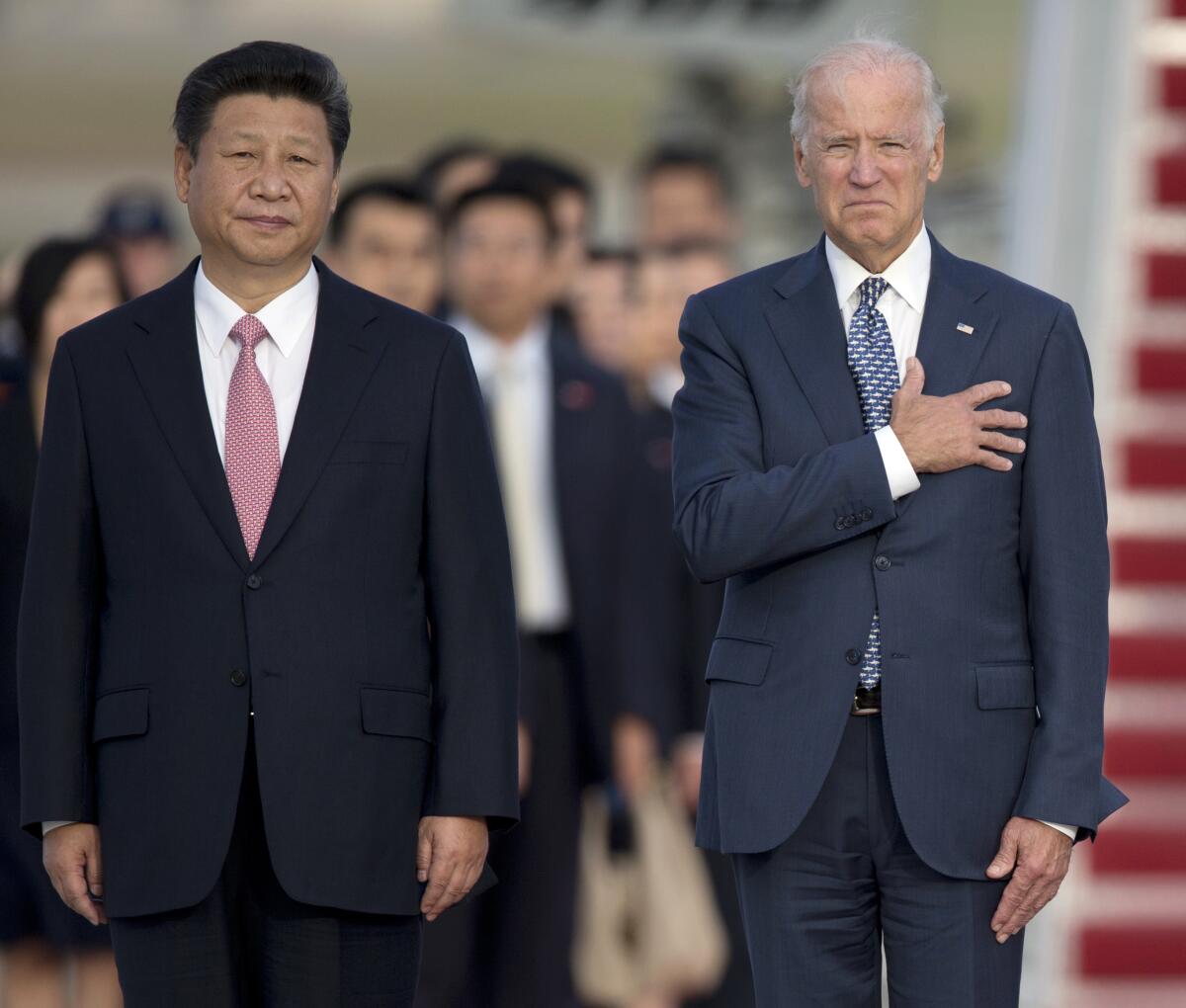We’re not ‘competing’ with China. But politicians love to make that claim

- Share via
In his address to Congress last month, President Biden used some variant of “compete” a dozen times. “We’re in competition with China and other countries to win the 21st century. We’re at a great inflection point in history.”
China’s President Xi Jinping, Biden said, is “deadly earnest about becoming the most significant, consequential nation in the world. He and others — autocrats — think that democracy can’t compete in the 21st century with autocracies because it takes too long to get consensus.”
In response, Biden insisted, we need to spend trillions on education and social welfare spending. “If I’ve heard it once, I’ve heard it a thousand times,” Biden said, quoting First Lady Jill Biden: “Joe, any country that out-educates us is going to outcompete us.” She was echoing a point Barack Obama often made: “We know the countries that out-teach us today will out-compete us tomorrow.”
The consensus on “competitiveness” extends far beyond the first couple. Economic competition is one of the oldest, and most bipartisan, cliches in American politics. And while it’s not entirely nonsense, it is mostly nonsense.
During the Cold War it was more defensible. The Soviet Union and the United States battled in a decades-long struggle not just for military and geopolitical dominance, but to win hearts and minds about who had the better system.
But even within the context of the Cold War, the competitive spirit led to excess. In 1989, about nine months before the fall of the Berlin Wall, policymakers were fretting that the Soviet Union could beat us in the race to develop high-definition TV.
There are three reasons politicians deploy the rhetoric of “competitiveness.” First, it lends a kind of macho heft to what politicians and policymakers want to do anyway. Second, it appeals to team spirit. Conceptually, it’s basically nationalism stripped of its unpleasant connotations. The message is: We all need to get onboard with this agenda to beat the other guys. That’s why Biden raised the supposed problem of reaching consensus. The upshot is we can’t waste time arguing amongst ourselves.
Third, it fuels the assumption that policymakers actually know what to do to make us more competitive. We can’t just let the market work — instead, we need to invest in this or that, the way we invest in munitions factories during a war.
This was the argument politicians made about Japan in the 1980s. We were in a race to win the future with Japan and so we had to mimic their industrial policy. And this is how politicians talk about China today.
China is certainly an international competitor — militarily, diplomatically and geo-strategically. But that fact lends no heft to the case for — or against — subsidized day care. It does make the case for increased military spending or more foreign aid, but those expenditures are less popular. Which just shows that competitiveness really isn’t the issue.
Indeed, one indicator the competitiveness claim is mostly about marketing and short-circuiting debate is that politicians will use the language of economic competition to justify things they’d want to do anyway.
Democrats want more generous entitlements, increased education spending and jobs programs. Claiming that these changes would make America more competitive with China makes this agenda sound tougher, more serious and more urgent. Likewise, Republicans use competition to push for reducing corporate tax rates, saying lower taxes will invite more innovation and investment here. They may have a point, but competitiveness is hardly the primary reason the GOP likes tax cuts.
The problem is that competitiveness, at least in the way it’s usually invoked, is a mirage. As Paul Krugman, the economist and columnist, wrote in 1994, “as a practical, empirical matter the major nations of the world are not to any significant degree in economic competition with each other.” Comparisons are interesting and bragging rights can be important. “But asserting that Japanese growth diminishes U.S. status is very different from saying that it reduces the U.S. standard of living — and it is the latter that the rhetoric of competitiveness asserts.”
Let’s look at that metric for a moment. Given all the China rhetoric, you’d think we were neck-and-neck with them. Well, the United States ranks 13th for per capita GDP (about $60,000 in 2017 dollars). But all the nations beating us have fewer than 10 million inhabitants. We’re still larger than all of them combined. Meanwhile China ranks 79th — behind Botswana, Bulgaria and Belarus. China’s median income is a fraction of ours. While Luxembourg and Switzerland are killing us.
And yet, we never hear politicians talk about the need to outcompete Luxembourgers or how the Swiss are winning the future.
@JonahDispatch
More to Read
A cure for the common opinion
Get thought-provoking perspectives with our weekly newsletter.
You may occasionally receive promotional content from the Los Angeles Times.










